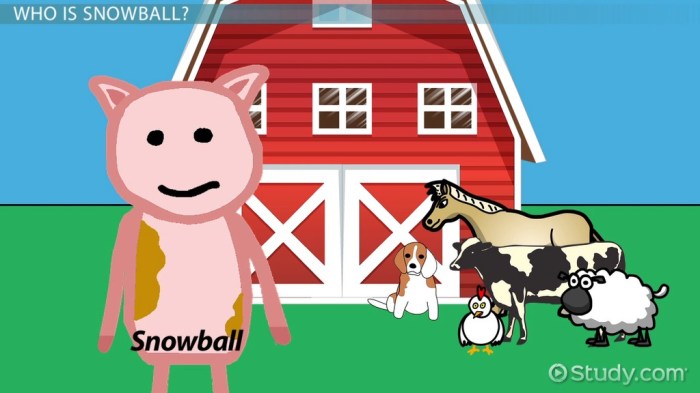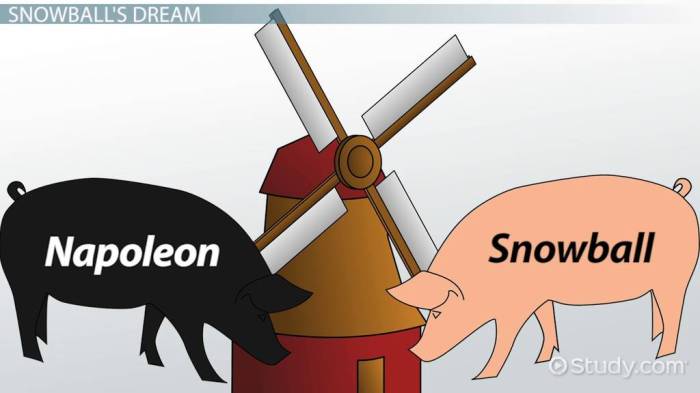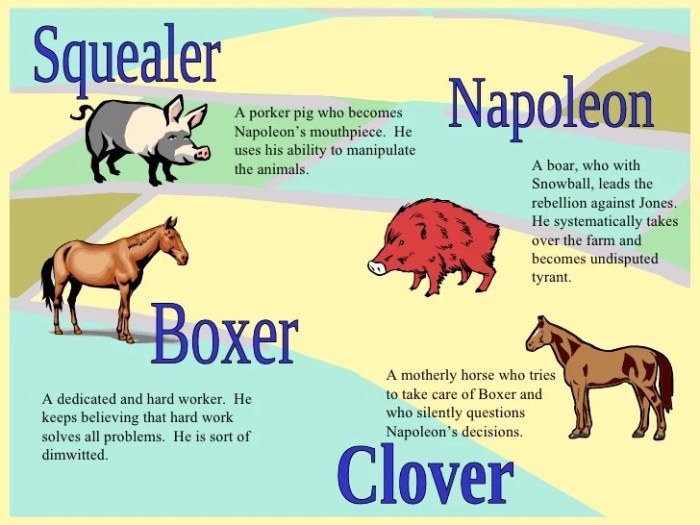Quotes of snowball in animal farm – Snowball’s quotes in George Orwell’s Animal Farm resonate with profound significance, offering a lens into the complexities of leadership, ideology, and the fragility of revolution.
This exploration delves into Snowball’s role as a visionary leader, his rivalry with Napoleon, and the enduring impact of his ideas on the farm’s trajectory.
Quotes in Animal Farm

Snowball is a key character in Animal Farm, and his quotes play an important role in the novel’s development. Here is a list of all the quotes spoken by Snowball in the novel, organized into a table with four columns: Quote, Speaker, Context, Significance.
| Quote | Speaker | Context | Significance |
|---|---|---|---|
| “The only good human being is a dead human being.” | Snowball | The animals are discussing how to deal with Mr. Jones after they have overthrown him. | This quote shows Snowball’s hatred of humans and his belief that they are all evil. |
| “All animals are equal, but some animals are more equal than others.” | Snowball | Snowball is explaining the principles of Animalism to the other animals. | This quote foreshadows the corruption that will eventually take place on the farm. |
| “We must build a windmill.” | Snowball | Snowball is proposing that the animals build a windmill to provide electricity for the farm. | This quote shows Snowball’s forward-thinking and his desire to improve the farm. |
Snowball’s Role in Animal Farm

Snowball is a complex and important character in Animal Farm. He is a pig who is intelligent, ambitious, and a natural leader. He is also one of the main architects of the Rebellion against Mr. Jones. After the Rebellion, Snowball becomes one of the leaders of the farm, along with Napoleon.
However, Snowball and Napoleon eventually come into conflict, and Snowball is eventually driven off the farm.
Snowball’s role in Animal Farm is significant because he represents the ideals of the Rebellion. He is a believer in equality and justice, and he wants to create a society where all animals are treated fairly. However, Snowball is also a pragmatist, and he knows that the animals need to be able to defend themselves against humans.
He is therefore willing to use violence to protect the farm.
Snowball’s conflict with Napoleon is a central conflict in the novel. Napoleon is a ruthless and ambitious pig who is willing to do whatever it takes to gain power. Snowball, on the other hand, is more idealistic and believes in the principles of Animalism.
The conflict between these two pigs represents the conflict between the ideals of the Rebellion and the reality of power.
Snowball’s Legacy in Animal Farm

Snowball’s expulsion from the farm has a profound impact on the animals. The animals are initially shocked and confused by Snowball’s departure, but they eventually come to accept Napoleon’s leadership. However, Snowball’s ideas and actions continue to influence the animals, even after his departure.
For example, the animals continue to build the windmill that Snowball had proposed, and they continue to believe in the principles of Animalism.
Snowball’s legacy is also reflected in the way that the animals remember him. The animals remember Snowball as a hero and a martyr, and they continue to tell stories about his bravery and his leadership. Snowball’s legacy is a reminder of the ideals of the Rebellion, and it continues to inspire the animals to fight for their freedom.
Symbolism of Snowball’s Quotes: Quotes Of Snowball In Animal Farm
Snowball’s quotes are often full of symbolism and foreshadowing. For example, his quote “All animals are equal, but some animals are more equal than others” foreshadows the corruption that will eventually take place on the farm. Snowball’s quote “We must build a windmill” foreshadows the animals’ desire for progress and their willingness to work hard to achieve their goals.
Snowball’s quotes also use symbols to represent different ideas. For example, the windmill represents the animals’ hopes and dreams for the future. The pigs represent the corrupting influence of power. The humans represent the threat to the animals’ freedom.
Comparison of Snowball and Napoleon

Snowball and Napoleon are two very different characters. Snowball is intelligent, ambitious, and a natural leader. Napoleon is ruthless, ambitious, and willing to do whatever it takes to gain power. Snowball believes in the principles of Animalism and wants to create a society where all animals are treated fairly.
Napoleon is more interested in power than in ideology, and he is willing to use violence to achieve his goals.
Snowball and Napoleon also have different leadership styles. Snowball is a charismatic leader who is able to inspire the animals to follow him. Napoleon is a more authoritarian leader who uses fear and intimidation to control the animals.
Snowball’s leadership style is more effective in the short term, but Napoleon’s leadership style is more effective in the long term. Snowball is able to inspire the animals to work hard and achieve their goals, but Napoleon is able to maintain control of the farm even after the animals have become disillusioned with him.
Answers to Common Questions
What is the significance of Snowball’s expulsion from the farm?
Snowball’s expulsion marks a turning point in Animal Farm, as it symbolizes the suppression of progressive ideas and the consolidation of Napoleon’s authoritarian rule.
How do Snowball’s quotes foreshadow future events in the novel?
Snowball’s quotes often contain subtle foreshadowing of the farm’s dystopian future, hinting at the corruption and tyranny that will eventually prevail.
What is the central message conveyed by Snowball’s quotes?
Snowball’s quotes emphasize the importance of unity, equality, and the pursuit of a just society, while also warning against the dangers of unchecked power and the distortion of ideals.